BOTH BRODERICK AND BABBITT NEED A BOOST
The La Jolla Playhouse is creating lots of buzz with the premiere of its adaptation of novelist Sinclair Lewis’s 1922 social satire Babbitt. The play is sold out for its run, which has already been extended to December 10. Much of the show’s audience appeal obviously resides with the appearance of star actor Matthew Broderick in the title role of George F. Babbitt, a white middle-class businessman living in a Midwestern city. Babbitt’s complacent social and political conservatism has earned the label “Babbitry” a secure place in the American language.
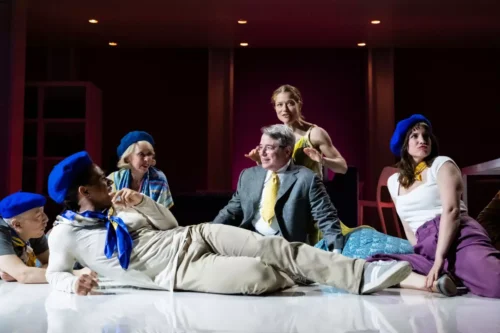 Matthew Broderick, center, with Francis Jue, Chris Myers, Julie Halston,
Genevieve Angelson and Anna Chlumsky.
Matthew Broderick, center, with Francis Jue, Chris Myers, Julie Halston,
Genevieve Angelson and Anna Chlumsky.Playwright Joe DiPietro and director Christopher Ashley have generally followed the Lewis original narrative but with their own footprints on the adaptation. The play begins in a modern library where a half dozen anonymous browsers are thumbing through assorted books. The browsers morph into the characters that surround Babbitt, including Babbitt’s wife, son, and daughter, and people who weave in and out of his life.
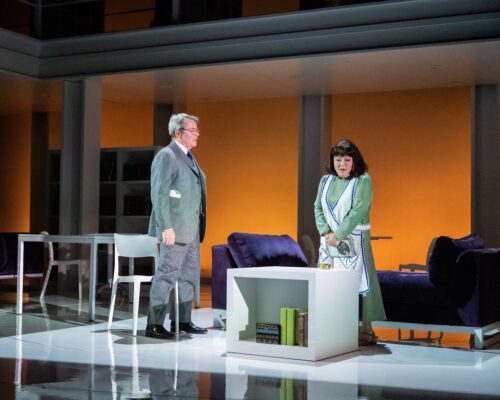
Babbitt is not a deep thinker, but he is a successful real estate agent, fitting in with the middle-class boosterism of the time. But late in the first act Babbitt achieves a personal conversion without much explanation, determining that he has been leading a meaningless life. In his 180-degree rotation from conformity to extreme liberalism, Babbitt alienates his narrow-minded associates and many of his friends. He assumes a new and liberating lifestyle, mingling with the socialists and outsiders he had previously scorned.
As the play ends, Babbitt returns to the security of his previous safe existence, admitting to himself that the cost of leaving his personal comfort zone was too high. And so passes Babbitt’s brief flirtation with the free life, leaving nary an ideological scar.
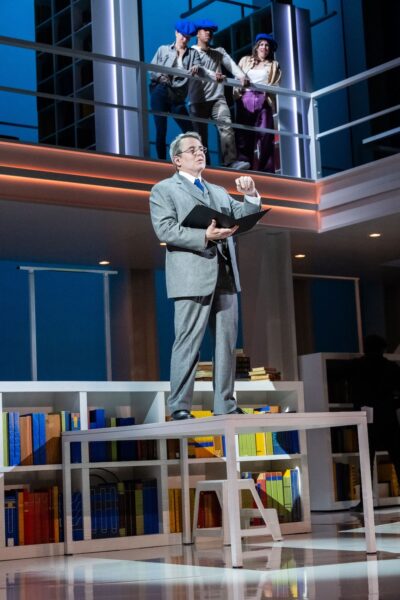
This adaptation clearly wants to connect the American society and culture of the early 1920s with what is going on in America during our day, at least from a liberal viewpoint. The audience, at least at my performance, laughed at the lampooning of right-wingers on the stage like they were cartoonish figures rather than menacing threats to the American way of life, arousing neither clapping nor boos.
Matthew Broderick gave a perplexing performance, at least on opening night. He fluffed numerous lines, which may be remedied as the run continues. But his rendering of Babbitt was curiously two-dimensional, presenting a Babbitt who spoke in a low, even tone, injecting very little feeling as he went along. Granted, Babbitt isn’t a hot-blooded dude, but there was a sameness to Broderick’s performance that at times was monotonous. In the second act, he opened up some. even breaking into a nimble jive dance that drew loud applause, maybe in gratitude that Babbitt was actually showing some energy.
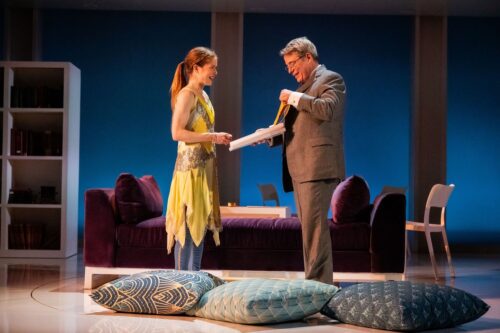
While Broderick was operating mostly in low gear dramatically, the six actors surrounding him were delivering performances of gratifying variety. First among equals is Ann Harada as Babbitt’s hardworking and long-suffering wife, who finally says enough is enough and breaks away from her tedious husband, if only temporarily. Also distinguishing themselves in multiple roles are Genevieve Angelson, Anna Chlumsky, Julie Halston, Matt McGrath, and Chris Myers.
Although Babbitt is set in the zeitgeist of the early 1920s, Linda Cho‘s costumes are not anchored in any time zone, but they are colorful and stylish. Walt Spangler‘s scenic design relies on a two-story modern library interior. I drew a blank on what the library motif was intended to signify thematically. Cha See designed the lighting, and Leon Rothenberg created the sound design. Mark Bennett and Wayne Barker are responsible for the music.
In the final reckoning, the first act of Babbitt didn’t do much for me, but the more humorous second act ratcheted up the entertainment level considerably. The audience got to enjoy Broderick’s lively solo dance, and loose ends in the storyline were wrapped up nicely. So the play improved as the show wound down, but I still anticipated more dramatic heft, both from the script and from Broderick.
photos by Jenna Selby
Babbitt
La Jolla Playhouse
Mandell Weiss Theatre, 2910 La Jolla Village Drive in La Jolla, CA
Tues, Wed at 7:30; Thurs & Fri at 8; Sat at 2 & 8; Sun at 2 & 7
ends on December 10, 2023
for tickets ($25 – $109), call 858.550.1010 or visit La Jolla Playhouse

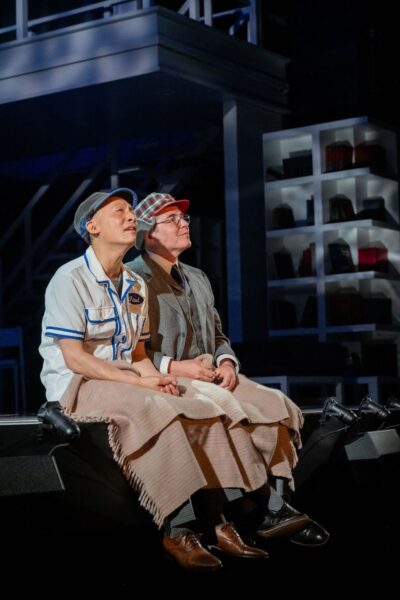

{ 1 comment… read it below or add one }
Hi Dan, Don’t know why I was thinking about Babbitt that I saw last year. Friends told me they enjoyed it and just knew it was going to Broadway. I scratched my head. I did not like it and agree with your review. I saw it in a preview show and curiously they stopped the play 5 minutes into it after Broderick had swung to the front of the stage in his bed. The cast marched off stage. They waited for something and then started from the top. My seat mate pointed out that the library browsers were all reading Babbitt. I said if you hadn’t told me, I wouldn’t have noticed. You wrote they were reading various books. So I guess if that was supposed to be an important message to the audience it missed your eyes as well. The whole library set piece didn’t convey anything to me. I thought Matthew’s performance was flat and I wasn’t roused by his speechifying on the platform. I didn’t see a giant impetus causing his transformation. I felt his wife was one of the best parts of the play.
I bought a season package this year and have been sorta disappointed on the whole. Did you see Sumo? I digress.
Just wanted you to know I appreciate having someone who had a similar experience with Babbitt affirming my puzzlement with the production.
Enjoy the new year.
Beth